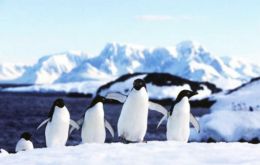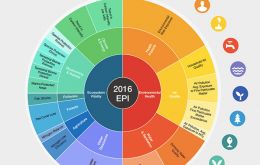MercoPress. South Atlantic News Agency
Environment
-
Friday, February 19th 2016 - 04:49 UTC
New study reveals patterns in Antarctic tourism: more visitors but highly concentrated in area

Results from a new study examining 20 years of commercial cruise activity in the Antarctic Peninsula region have important implications for Antarctic visitor management. The paper was published online this week in the journal Antarctic Science, according to the latest release from IAATO.
-
Friday, February 19th 2016 - 04:24 UTC
Brazil biggest environmental disaster: compensation agreement could be signed this week

The Brazilian government expects to reach an agreement by Friday with Samarco Mineração to settle a 20 billion-real (US$4.9 billion) lawsuit for damages in the deadly dam disaster which burst in inland Minas Gerais creating a tsunami of mud and waste that killed 17 people and reached the Atlantic ocean.
-
Tuesday, February 16th 2016 - 08:30 UTC
Blocked access to food in Antarctica kills an estimated 150.000 Adelie penguins

Scientists say an estimated 150,000 Adelie penguins have been wiped out on Antarctica's Cape Denison in the five years since a giant iceberg blocked their main access to food. A study recently published in the journal Antarctic Science says the B09B iceberg crashed with the Mertz Glacier Tongue and got stuck in Commonwealth Bay, an area that was rarely covered by sea-ice, making it ideal for Adelie penguin colonies.
-
Thursday, February 11th 2016 - 05:45 UTC
ICAO agrees on first binding limits on emissions from the aviation industry

UN Secretary-General Ban Ki-moon welcomed the announcement by the International Civil Aviation Organization (ICAO) proposing the first binding limits on emissions from the aviation industry.
-
Thursday, February 11th 2016 - 05:40 UTC
Brazil reopens crucial waterway for transporting soy; water was used to generate power

Brazil's Tiete-Parana waterway, a key transport corridor for soybeans, corn, cellulose, fertilizer and other agricultural products, has reopened after a 20-month closure due to drought and the use of water for electricity, the Estado de S. Paulo newspaper reported this week.
-
Saturday, February 6th 2016 - 05:29 UTC
US promotes major traceability plan for fishery products to combat IUU

The United States National Oceanic and Atmosphereric Administration (NOAA) announced a proposal to implement a traceability plan for fishery products, aimed at combating illegal, unreported and unregulated (IUU) fishing and to prevent fraudulent trade.
-
Friday, February 5th 2016 - 08:31 UTC
World cereal stocks are set to end 2016 seasons at 642 million tons, higher than they began.

Weather patterns associated with El Niño are sending mixed signals about the early prospects for cereal crops in 2016, especially in the Southern Hemisphere, according to FAO's Cereal Supply and Demand Brief, released on Thursday.
-
Tuesday, February 2nd 2016 - 06:24 UTC
IAATO animated briefings for Antarctic visitors

New videos have been developed by the International Association of Antarctica Tour Operators (IAATO) to brief travelers en route to Antarctica. They reinforce actions visitors need to take to ensure their visit is safe and environmentally sensitive.
-
Thursday, January 28th 2016 - 06:28 UTC
Guanabara Bay pollution at the heart of Olympics sailing competition controversy

The former CEO of World Sailing says he was fired for pushing to get rid of polluted Guanabara Bay as the sailing venue for this year’s Olympics in Rio de Janeiro. Peter Sowrey tried to change the venue, or at least have a “B plan” but says “I was told to gag myself on the subject.”
-
Tuesday, January 26th 2016 - 12:22 UTC
Dire state of fisheries and worsening air pollution, revealed by Environmental performance index

The worrying state of many fisheries and worsening air pollution are some of the problems revealed by the 2016 Index of Environmental Performance (EPI), an initiative that assesses how 180 countries protect ecosystems and human health of environmental damage.
